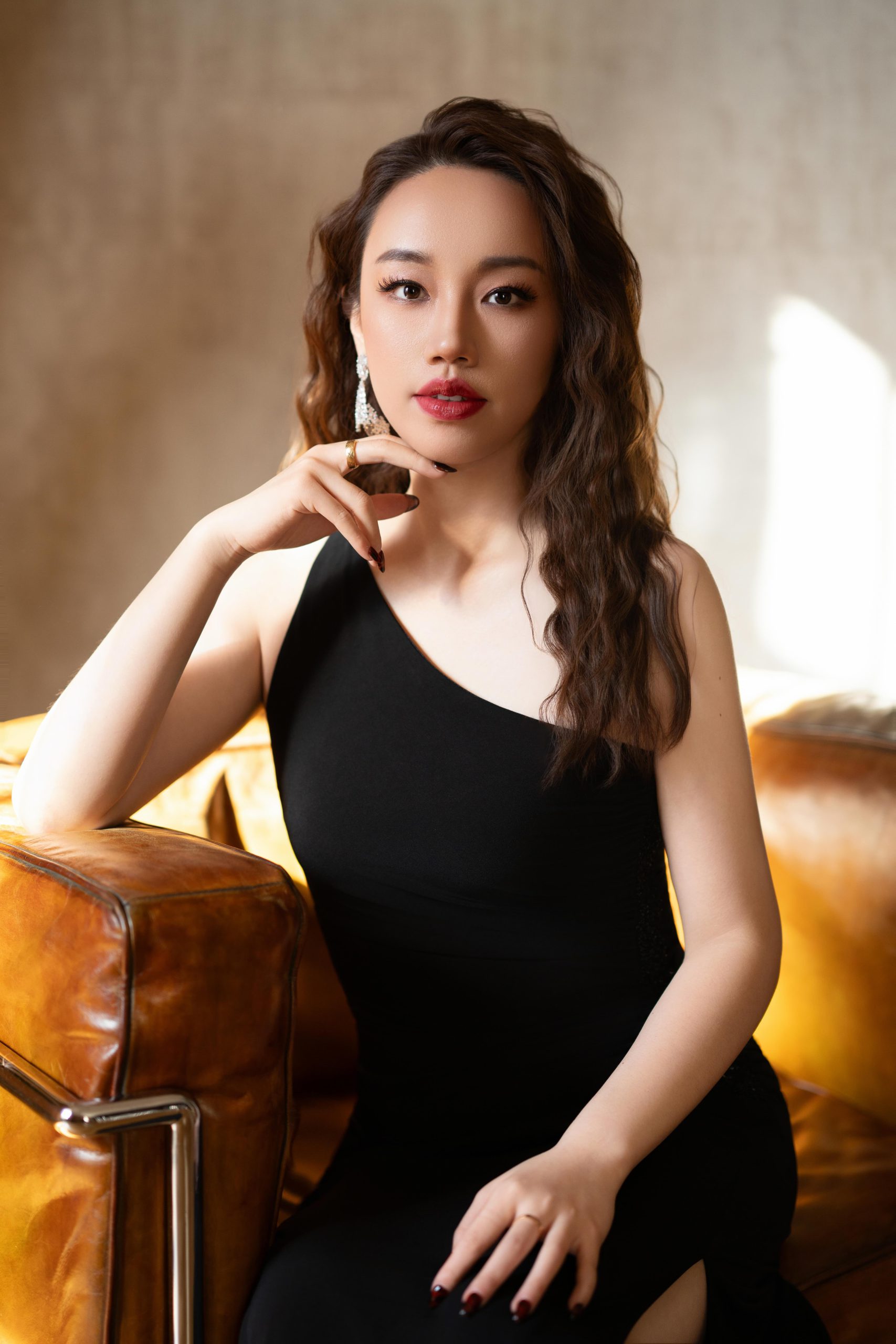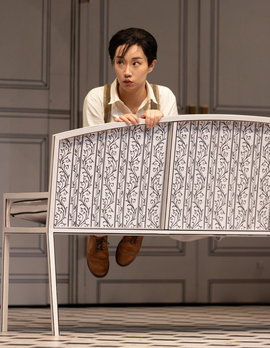People in the News
New Artist of the Month: Mezzo-soprano Hongni Wu
 When Hongni Wu bounded across the stage as Cherubino in Santa Fe Opera’s Marriage of Figaro last summer, she seemed to compress a teenager’s swirl of conflicted emotions into a single breath.
When Hongni Wu bounded across the stage as Cherubino in Santa Fe Opera’s Marriage of Figaro last summer, she seemed to compress a teenager’s swirl of conflicted emotions into a single breath.
Under Laurent Pelly’s ingenious clockwork staging—its revolving gears an emblem of the circular machinery of desire—Wu’s lovesick page darted through corridors of intrigue with quicksilver energy and a touch of disarming sincerity. Her agile voice made each impulse feel spontaneous yet perfectly timed within Mozart’s intricate design.
That same vitality will find a new outlet this month, when Wu appears in the world premiere of Huang Ruo’s The Monkey King at San Francisco Opera (opening November 14). She will create the roles of Venus Star, the Jade Emperor’s wily counselor, and Crab General, a member of the undersea court Monkey visits in his quest for a weapon. The Monkey King marks Wu’s sixth venture into contemporary opera—an opportunity that suits her appetite for fresh challenges and for roles that are not limited by their familiarity in the public imagination.
From Porcelain to Puccini
Wu’s path to the opera stage runs from Jingdezhen, the porcelain capital of China, to London by way of New York, propelled by a steady refusal to be boxed in. She grew up in a non-musical household but with supportive parents—a ballet-trained mother and a father who runs a ceramics business.
She was nonetheless encouraged to take piano lessons from the age of five as a way to channel creativity and discipline. Wu also recalls spending hours singing along to Chinese and Korean pop songs on her MP3 player.
One day, a family friend who taught voice heard her singing and suggested Wu might have potential. That encounter eventually led to a pattern of long weekly commutes to Guangzhou for classical voice lessons and then to Xinghai Conservatory, where she was the youngest in her class. Not until then did Wu see her first Western opera: a production of Madama Butterfly. “I was there from the dress rehearsal until the last show,” she recalls. “I bought every ticket and cried every time.” It was the experience that made opera feel like home.
After graduating from Xinghai, Wu moved to New York to study at the Manhattan School of Music. The adjustment was jarring: “At home, I’d been the best singer in school,” Wu recalls. “Then I came here and realized everybody was the best singer in their school. And the standard, the beauty of voice, the technique—it was really different from China.”
Finding Her Voice
At 20, Wu was singing Carmen and Dalila, until one teacher cautioned, “You can be the best Carmen in the world one day, but not right now.” Seeking a new direction, Wu turned to MSM faculty member and celebrated soprano Joan Patenaude-Yarnell, who, she recalls, described her voice as “not big, not small, but wild,” and guided her toward Mozart and bel canto repertoire to learn, as Wu puts it, “how to use my voice in a smart way.” The shift reshaped her technique and sense of identity as a singer.
Her first major test came as Sesto in La clemenza di Tito, a breakthrough in confidence. In 2018, at 23, she emerged as one of the winners at the Metropolitan Opera National Council Auditions—despite being advised to wait until she was more prepared. Wu soon made her professional debut as Prince Orlofsky in Die Fledermaus with the Martina Arroyo Foundation in New York. The following year, she joined the Royal Opera House’s Jette Parker Young Artists Programme, where she sang Mercédès in Carmen and stepped in at the last minute as Sibél in Faust—learning the role in just a few days.
Her most demanding challenge came with Hans Werner Henze’s Phaedra. At first, Phaedra felt alien—“so modern it scared me,” Wu says—but through movement coaching, she found a way into the character’s fractured, half-human psyche. “My teacher told me: ‘Don’t think like a human—think like an animal,’” Wu recalls. “Once I did that, I started to understand Phaedra.” The experience was transformative. “People told me I was a real animal on stage,” she says. “That was when I realized I could also be an actor.”
 Beyond the Box
Beyond the Box
Wu was likewise finding her footing in the standard repertoire. Rossini, in particular, has become a touchstone. At the Manhattan School of Music, she sang Isabella in L’italiana in Algeri—a role she feels “lies in my DNA”—and she chose Isabella’s aria “Crudele sorte” for her Metropolitan Opera National Council audition. Following her appearances in The Monkey King this fall, Wu returns to San Francisco Opera for its summer season to sing Rosina in Il barbiere di Siviglia.
The company earned Wu’s lasting gratitude for how it treated her during the pandemic. When she made her debut there as Bao Chai in Bright Sheng’s Dream of the Red Chamber in 2022, she contracted COVID after her second performance. “I thought I was finished,” Wu recalls. “I couldn’t sing, and I didn’t know how I’d even pay rent.” Instead, SFO paid her for every show she’d been scheduled to sing.
Wu resists being boxed into any single mezzo label. “I’m just a mezzo who can sing high and low and in between,” she says. “I don’t want to limit myself.” At first, she worried that taking on Suzuki—a role she’d often been urged to sing—might do just that. But when the Royal Opera offered it, she decided to see what she could make of it. Wu had moved past her fear of being typecast and wanted to test herself against a role people thought they knew. Working with Asmik Grigorian as Butterfly deepened that resolve: watching her emotional honesty and freedom onstage, Wu saw how a role like Suzuki could hold depth if she brought her own instincts to it.
That openness was on display last summer in Santa Fe, where Wu shaped her Cherubino performing opposite no fewer than three different Countesses over the course of the run. “When I looked into their eyes, I had to make them feel I was in love at that moment,” recalls Wu. “I like to make colors with my voice. If I can’t—if I just sing beautifully—that’s bullshit to me. I don’t want to be that boring. I need people to feel what I feel.”
Top photo credit: Ed Choo
Bottom: Brownwen Sharp





 FEATURED JOBS
FEATURED JOBS

 RENT A PHOTO
RENT A PHOTO


